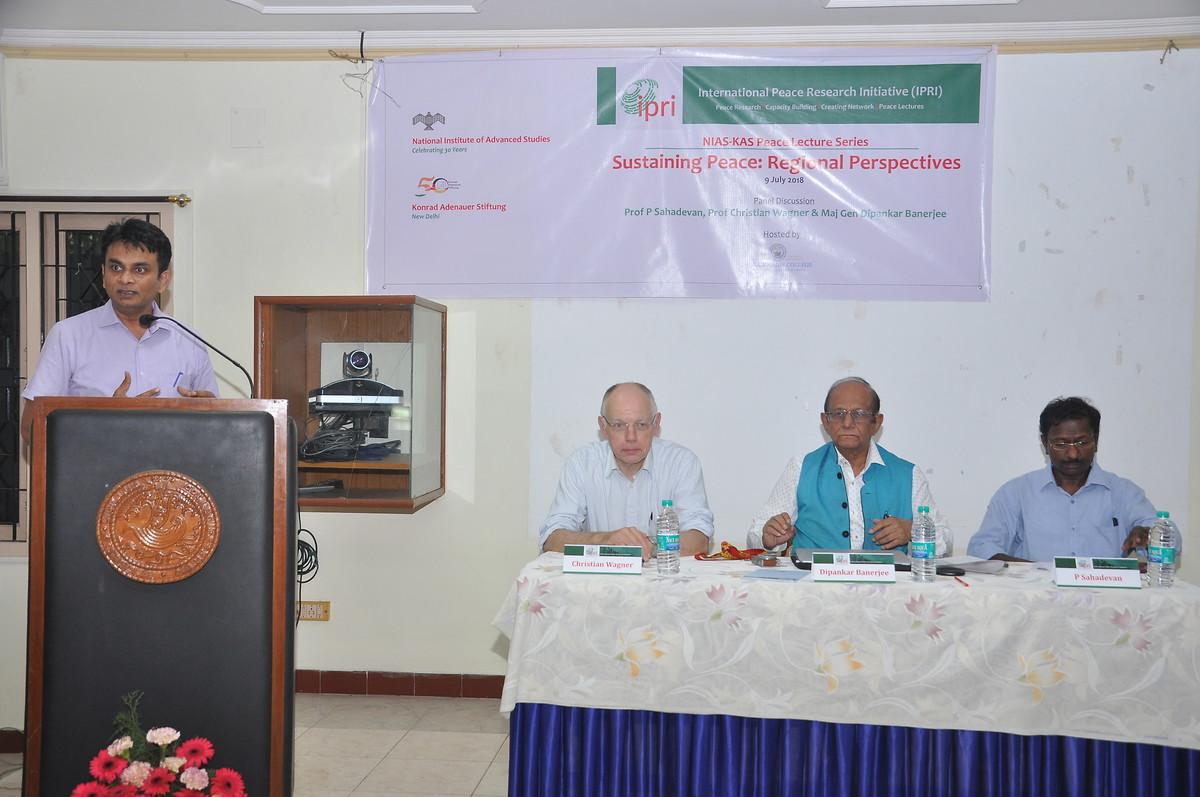Event reports
In his introductory words, Prof. Suba D. Chandran, Dean of the School of Conflict and Security Studies at NIAS, explained the concept of the NIAS-KAS Lectures on Peace. Each lecture will focus on a specific topic, which will be commented on by two experts, and take place in different locations in India.
In the first lecture, moderated by Major General Banerjee, Member of the Board of the Forum for Strategic Initiatives (FSI), Prof. P. Sahadevan, Professor at the Center for South Asian Studies at Jawaharlal Nehru University, focused on South Asian experiences in peace-making and Dr. Christian Wagner, Senior Fellow of the German Institute for International and Security Affairs, focused on the European experiences of how to sustain peace.
Prof. Sahadevan commented on current trends in peace making in South Asia. He mentioned that there is a strong element of militarism in the approach and strategy in the making of peace, which means that the military is increasingly influencing processes to achieve peace. At the same time, there is a trend in general that the threat to the sovereignty of states is waning and the rhetoric of reconciliation is increasing. But he also analyzed that a whole range of conflict and peace-building issues had the possibility of being ignored by the stakeholders and decision makers. For example, conflict is still not perceived as a governance problem although governance can play an important role in making peace. Moreover, on the state side, insufficient attention was paid to the fact that state coercive measures should only be used with caution and justice. On the other hand, non-governmental actors have not yet come to the conclusion that terrorism always fails as a strategy to achieve their goals and resolve conflicts, even usually achieve the opposite.
Dr. Wagner explained the process of European integration, which began with the original idea of bringing a lasting peace between the countries of Europe after the devastation of the Second World War and preventing further conflicts. With the creation of the European Coal and Steel Community (ECSC), the coal and steel resources needed for war were put under joint control by the then Member States - Belgium, the Federal Republic of Germany, France, Italy, Luxembourg and the Netherlands. Further agreements, as well as the admission of other states, ensured that further integration almost completely eliminated the potential for conflict between the countries, thus creating a sustaining peace. The European Union is thus an example of how integration can achieve sustainable peace.
Philipp Huchel, Research Associate at the India Office of the Konrad-Adenauer-Stiftung, thanked the two speakers in his closing remarks and emphasized the importance of regional integration for sustainable peace. He emphasized that, in the face of increasing global crises, the question of how to achieve a sustainable peace is and will be highly relevant.
The NIAS-KAS Peace Lecture Series is part of NIAS and KAS newly launched International Peace Research Initiative (IPRI). With the International Peace Research Initiative (IPRI), the KAS and NIAS aim to provide a platform for research on peace, development of policy recommendations, networking and capacity building for peace and conflict researchers.





